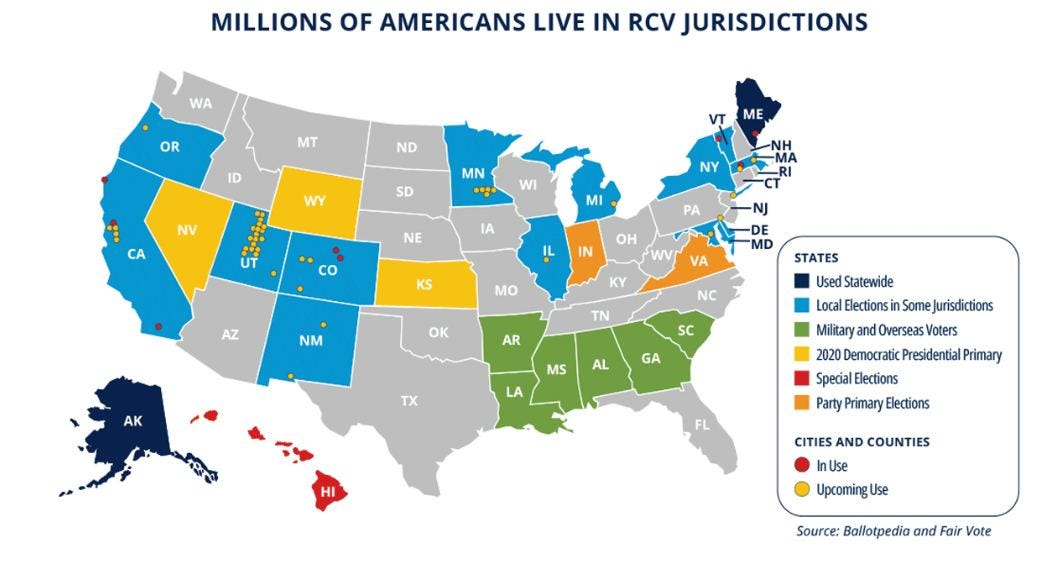I don’t openly resent people for supporting most political or ideological views if they are able to defend those views. I may find those views to be destructive and dangerous to future prosperity and preservation of liberty, but my actual resentment is reserved toward those who lash out emotionally over what they’ve been told to by the mainstream media and celebrity influencers.
This is why I spend so much time rehashing lessons and explaining very rudimentary things when it comes to elections, liberty, and history. A popular hot-button topic on the dissident right pertaining to elections is opposition to Ranked Choice Voting (RCV). RCV has kept Maine’s 2nd Congressional District with the blue team in the U.S. House, despite Trump’s dominance there, and has also installed a Democrat U.S. Representative and re-installed RINO-extraordinaire Lisa Murkowski in the U.S. Senate.
It is simply not enough to scream about the rapidly expanding system, now up for discussion in Georgia, if we don’t know why it is dangerous. You can read about how it actually works here.
Once you understand how the votes are tallied and re-allotted, read on about the 10 slam dunk reasons you should oppose RCV. These are particularly useful for your base of knowledge when you give testimony locally as to why RCV should be disqualified, as it was in Tennessee and Florida in 2022. Soak it up and spread it around.
TOP TEN REASONS TO OPPOSE RCV (in no order)
Center/Center Left Source: This article serves as a psychological teardown of RCV as an issue.
1) Despite claims RCV will minimize power of the two-party system, the winner will always be from one of the two major parties because a packed slate of independent or minor party candidates will always split votes with each another.
2) RCV does not allow a voter to vote against any options, only to rank them lower than others.
3) Voters do not vote sincerely, but rather strategically to ensure their worst option does not win. This is no different than voting for a candidate in normal voting formats only so his opponent doesn’t win.
Moderate Source: Written by professors; highlights Alaska’s House race and its idiocy.
4) Extreme candidates are more likely to be elected when the electorate is polarized.
5) Moderate candidates garner many second-place votes but are outflanked by first-place votes; moderate candidates are unlikely to be elected in such a system, perpetuating the polarized political system.
Conservative Source: the most in-depth and analytical of the three sources used here.
6) “Ballot exhaustion,” the process of discarding ballots that aren’t fully voted if instant run-offs are needed beyond the number of votes cast on a ballot, discards votes, thereby negating an individual voter’s voice.
7) Districts using RCV have lower turnout rates.
Minneapolis and St. Paul, as well as San Francisco, have lagged other major metros for voter turnout since adopting RCV. Turnout in off-year elections drops by an average of eight percent.
8) RCV discourages participation from new and infrequent voters because its instructions are confusing. Urban areas, which actively argue against Voter ID, are effectively disenfranchising voters, as they tend to be areas in which more minorities and low propensity voters are likely to live.
9) RCV requires transportation of ballots to centralized facility in event of instant runoff, which leads to increased cost and opportunities for mismanagement (electoral fraud).
10) Changes to ballot counting process often require weeks to report results (as seen in Alaska’s 2022 midterm).
a. 71% of all voters are likely to oppose RCV when they are informed that the process increased election irregularities.
b. 66% are likely to oppose RCV when they learn results may take weeks to report.
CONCLUSION
If RCV didn’t provide another window for the political elite to control elections, they wouldn’t be pushing it like wildfire, especially in emerging swing states like Georgia. Being able to use stalking horse candidates like Nick Begich or simply flooding enough fraudulent ballots into the first round to keep a candidate under 50% are tricks the political establishment would like to have at its disposal. It is your responsibility to be armed with facts and oppose RCV with your head, and not only with your keyboard.






Ranked Choice Voting actually would have worked if used as envisioned in the early 2000s by the techno-libertarians.
Slide candiates around on a touch screen and a honestly and open-sourced programmed computer to just spits out the results. Seriously, what could be easier? Slide Smiling dwarf Ross Perot to the Top, Slick Willie to the bottom and then GHWB gets elected to his second term.
But since it soon became mantra that we can't trust "the other side" to write an honest computer program (remember Dems rally against Diebold touch screens?), so things with a good UI that look obviously like a computer disappeared and instead we get computers disguised as bubble counter.
And yet RCV stuck around and morphed into this confusion quasi-paper ballot crap which no-one could ever hand verify.
Single-issue paper ballots that are hand-counted are the only fair way forward. Its noteworthy that this is how the UK still does it.
In other words, RCV might just well stand for "Republicans Conceding Voting" to the Democrats.